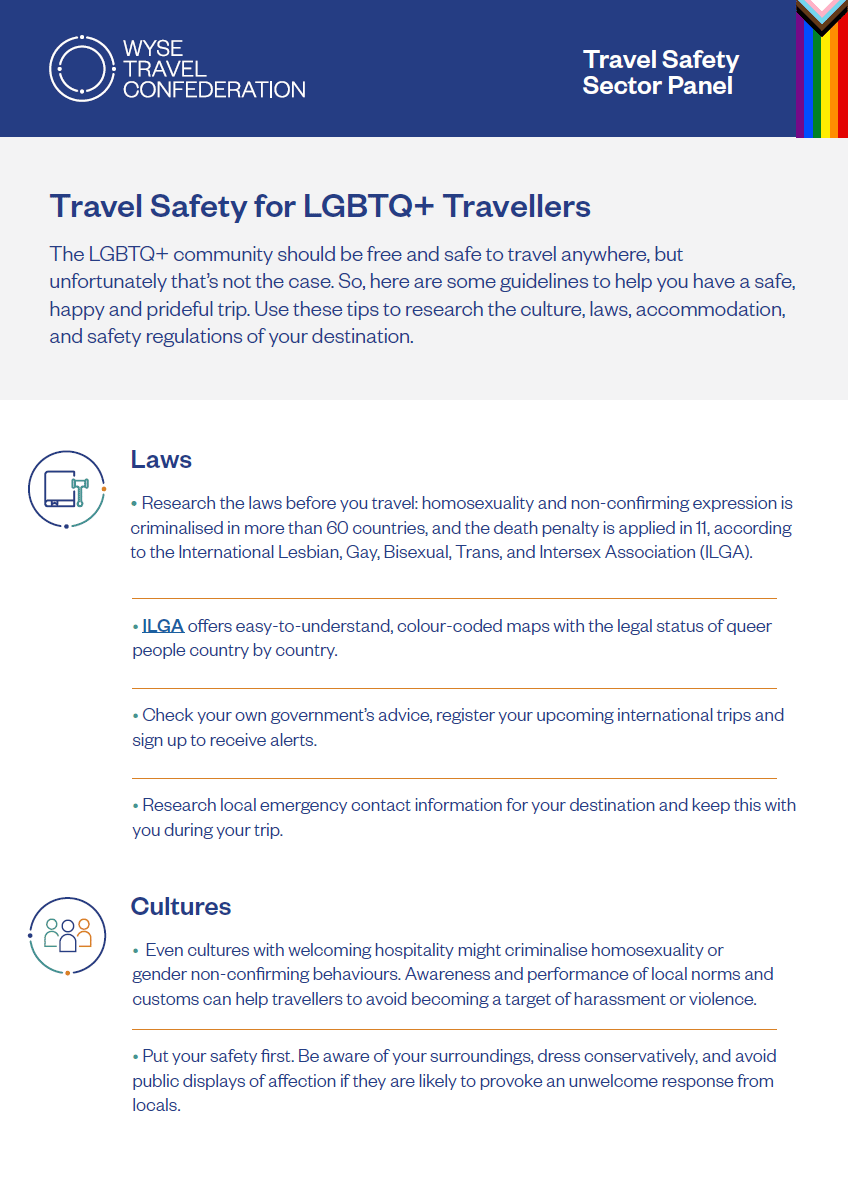LGBTQ+ Travellers
The LGBTQ+ community should be free and safe to travel anywhere, but unfortunately that’s not the case. While significant strides have been made in advancing LGBTQ+ rights worldwide, the experience of LGBTQ+ travellers is still marred by challenges related to discrimination, safety concerns, and legal disparities.
The WYSE Travel Confederation Travel Safety Sector Panel and a few other contributors have created some guidelines to help the traveller have a safe, happy, and prideful trip.This guideline is created as a useful set of guidelines that organisations can share with their customers.
Highlights
By embracing the unique needs and worries of LGBTQ+ travellers and making use of the resources available to us, this guideline covers a few topics around travel. LGBTQ+ travellers may have different needs and concerns compared to the general population and so travel guidelines should be inclusive and sensitive to these unique aspects of their experiences.
Guidelines
These guidelines take advantage of the available information, knowledge, and support systems to provide comprehensive advice. This is not an exhaustive guide but addresses key topics that are particularly relevant to LGBTQ+ travellers.
Around the topic of law and LGBTQ+ travellers, it is important to note travellers have identification that matches one gender identity. And it is a positive change that some countries have begun to issue non-binary passports, however not all countries recognise non-binary identification, and therefore traveling with a new non-binary passport may lead to issues with border officers.
Laws
- Research the laws before you travel: homosexuality and non-confirming expression is criminalised in more than 60 countries, and the death penalty is applied in 11, according to the International Lesbian, Gay, Bisexual, Trans, and Intersex Association (ILGA).
- ILGA offers easy-to-understand, colour-coded maps with the legal status of queer people country by country.
- Check your own government’s advice, register your upcoming international trips and sign up to receive alerts.
- Research local emergency contact information for your destination and keep this with you during your trip.
Cultures
- Even cultures with welcoming hospitality might criminalise homosexuality or gender non-confirming behaviours. Awareness and performance of local norms and customs can help travellers to avoid becoming a target of harassment or violence.
- Put your safety first. Be aware of your surroundings, dress conservatively, and avoid public displays of affection if they are likely to provoke an unwelcome response from locals.
Finding LGBTQ+-friendly accommodation
- Finding queer-friendly places to stay will help your trip run smoothly.
- The International LGBTQ+ Travel Association (IGLTA) has travel guides and lists of queer-welcoming accommodation.
- Lesbian-run Once Upon a Journey offers tips for finding accommodation, destinations, and trips catering to queer women travellers.
- Travellers who are trans or non-binary should ask hostels and hotels if single rooms and private bathrooms are available. Prior to departure, trans and non-binary travellers should ask hostels and hotels if they offer gender-segregated accommodation.
How to meet your community when travelling
- Before you travel, use hashtags and the search feature on Instagram, TikTok and Facebook to find local LGBTQ+ cafes, bars, clubs and other hangouts.
- Consider hiring a local queer tour guide for an orientation to the city.
- If you’re anxious, coincide your trip with a Pride celebration, LGBTQ+ film festival or similar event.
- If you use same-sex dating or hook-up apps, only meet in public spaces, never go alone; and tell someone your plans.
Places you'll feel welcome
- Consider spending your money in destinations with highly regarded reputations for welcoming LGBTQ+ people like Stockholm, Thailand, Great Britain, Fort Lauderdale, Florida, Puerto Rico, New York City, West Hollywood and San Francisco.
- IGLTA has many more LGBTQ+-welcoming destinations with links to websites where you can start planning a queer-friendly vacation.
- Younger travellers should consider budget-friendly operators, specialising in inclusive social travel for 18 to 35-year-olds.
- MeetUp is a social site facilitating gatherings including many LGBTQ+ meetups all over the world.
Coming out while travelling
- Before you travel, use hashtags and the search feature on Instagram, TikTok and Facebook to find local LGBTQ+ cafes, bars, clubs and other hangouts.
- Consider hiring a local queer tour guide for an orientation to the city.
- If you’re anxious, coincide your trip with a Pride celebration, LGBTQ+ film festival or similar event.
- If you use same-sex dating or hook-up apps, only meet in public spaces, never go alone; and tell someone your plans.
What to do when you feel unsafe
- Remove yourself from the situation as soon as possible and head to your accommodation or another safe space.
- In an emergency or life-threatening situation, call the local emergency services number or your nearest embassy or consulate.
WYSE Travel Confederation Travel Safety Sector Panel

The Travel Safety Sector Panel at WYSTC 2023 (names from left to right) Sara McNamara – Senior Vice President, AUPairCare, Claudia Reichstein – Director, International Sales, DR-WALTER, Nick Pound – Travel Safety Panel Chair – Director of Partnerships, World Nomads, Linda Langin – President, CareMed International Travel Insurance, Niki Duncan – International Community Membership Manager, WYSE Travel Confederation, David Chapman, Director General , WYSE Travel Confederation
A few other resources to use:
- ILGA offers easy-to-understand, colour-coded maps with the legal status of queer
people country by country. - National Geographic: Does travel mean going into the closet? LGBTQ+ tourists face tough choices
- GoAbroad – An Initiative to Make Travel More Inclusive from LGBTQ traveler’s perspectives
- IGLTA has many more welcoming destinations
- MeetUp is a social site facilitating gatherings



